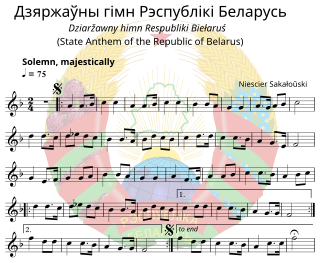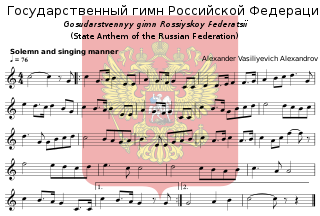An anthem is a musical composition of celebration, usually used as a symbol for a distinct group, particularly the national anthems of countries. Originally, and in music theory and religious contexts, it also refers more particularly to short sacred choral work and still more particularly to a specific form of liturgical music. In this sense, its use began c. 1550 in English-speaking churches; it uses English language words, in contrast to the originally Roman Catholic 'motet' which sets a Latin text.

"March On, Bahamaland" is the national anthem of the Bahamas. Timothy Gibson composed the music and authored the lyrics. It was adopted as the national anthem in 1973, when the country gained independence from the United Kingdom.

"Jamaica, Land We Love" is the national anthem of Jamaica, officially adopted in July 1962. It was chosen after a competition from September 1961 to 31 March 1962, in which the lyrics of the national anthem were selected by Jamaica's Houses of Parliament. When Jamaica was granted independence on 6 August 1962, "Jamaica, Land We Love" continued to be officially used as the national anthem.
A national anthem is a patriotic musical composition symbolizing and evoking eulogies of the history and traditions of a country or nation. The majority of national anthems are marches or hymns in style. American, Central Asian, and European nations tend towards more ornate and operatic pieces, while those in the Middle East, Oceania, Africa, and the Caribbean use a more simplistic fanfare. Some countries that are devolved into multiple constituent states have their own official musical compositions for them ; their constituencies' songs are sometimes referred to as national anthems even though they are not sovereign states.

The "Swiss Psalm" is the national anthem of Switzerland.

"Aegukga", often translated as "The Patriotic Song", is the national anthem of the Republic of Korea. It was adopted in 1948, the year the country was founded. Its music was composed in the 1930s and arranged most recently in 2018; its lyrics date back to the 1890s. The lyrics of "Aegukga" were originally set to the music of the Scottish song "Auld Lang Syne" before Ahn Eak-tai composed a unique melody specifically for it in 1936. Before the founding of South Korea, the song, set to the music of "Auld Lang Syne", was sung, as well when Korea was under Japanese rule by dissidents. The version set to the melody composed by Ahn Eak-tai was adopted as the national anthem of the Korean exile government, which existed during Korea's occupation by Japan from the early 1910s to the mid-1940s.

"Stand and Sing of Zambia, Proud and Free" is the national anthem of Zambia. The tune is taken from the hymn "Nkosi Sikelel' iAfrika", which was composed by Xhosa composer Enoch Sontonga, in 1897. The lyrics were composed after Zambian independence to specifically reflect Zambia, as opposed to Sontonga's lyrics, which refer to Africa as a whole.

"Kassaman", or "Qassaman", is the national anthem of Algeria. Moufdi Zakaria authored the lyrics, while the music was composed by Egyptian composer Mohamed Fawzi. The song was adopted as the national anthem in 1962, when the country gained independence from France.

The "State Anthem of the Republic of Belarus", better known as "My Belarusy", is the national anthem of Belarus. It was originally written in the 1940s and adopted in 1955 for use in the Byelorussian Soviet Socialist Republic. The music of the Byelorussian SSR's regional anthem was composed by Niescier Sakałoŭski and the lyrics were written by Michas Klimkovič. After the dissolution of the Soviet Union, the music composed by Sakalowski was kept and the lyrics were discarded. New lyrics, which were written by Klimkovič and Uladzimir Karyzna, were adopted by a presidential decree issued on 2 July 2002.

The "Brazilian National Anthem" was composed by Francisco Manuel da Silva in 1831 and had been given at least two sets of unofficial lyrics before a 1922 decree by president Epitácio Pessoa gave the anthem its definitive, official lyrics, by Joaquim Osório Duque-Estrada, after several changes were made to his proposal, written in 1909.

The "State Anthem of the Russian Federation" is the national anthem of Russia. It uses the same melody as the "State Anthem of the Soviet Union", composed by Alexander Alexandrov, and new lyrics by Sergey Mikhalkov, who had collaborated with Gabriel El-Registan on the original anthem. From 1944, that earliest version replaced "The Internationale" as a new, more Soviet-centric and Russia-centric Soviet anthem. The same melody, but without any lyrics, was used after 1956. A second version of the lyrics was written by Mikhalkov in 1970 and adopted in 1977, placing less emphasis on World War II and more on the victory of communism, and without mentioning Joseph Stalin by name.

"Denes nad Makedonija" is the national anthem of North Macedonia. Todor Skalovski composed the music and Vlado Maleski wrote the lyrics of the song in the early 1940s. It was adopted as the national anthem in 1992, almost a year after the state's independence from Yugoslavia. Before its adoption as a national anthem, it was used as the regional anthem of the Socialist Republic of Macedonia, a constituent state of Yugoslavia, before it became the national anthem of the Republic of North Macedonia.

"Oh Uganda, Land of Beauty" is the national anthem of Uganda. George Wilberforce Kakoma composed the music and authored the lyrics. It was adopted as the national anthem in 1962, when the country gained independence from the United Kingdom. It is musically one of the shortest national anthems in the world. Consequently, multiple verses are sung when it is performed in public.

"Qaumī Tarānāh", also known as "Pāk Sarzamīn", is the national anthem of the Islamic Republic of Pakistan and formerly the Dominion of Pakistan. It was written in Urdu by Hafeez Jalandhari in 1952 and the music was composed by Ahmad G. Chagla in 1949, preceding the lyrics. It was broadcast publicly for the first time on Radio Pakistan on 13 August 1954, sung by Jalandhari himself and officially adopted on 16 August 1954 by the Interior Ministry of the Government of Pakistan.

American patriotic music is a part of the culture and history of the United States since its foundation in the 18th Century. It has served to encourage feelings of honor both for the country's forefathers and for national unity. They include hymns, military themes, national songs, and musical numbers from stage and screen, as well as others adapted from many poems. Much of American patriotic music owes its origins to six main wars — the American Revolution, the American Indian Wars, the War of 1812, the Mexican–American War, the American Civil War, and the Spanish–American War. During the period prior to American independence, much of the country's patriotic music was aligned with the political ambitions of the British in the new land. And so, several songs are tied with the country's British origin.
Luker is idiomatic Australian English for "money".

The people of Guyana, or Guyanese, come from a wide array of backgrounds and cultures including aboriginal natives, African and Indian origins, as well as a minority of Chinese and European descendant peoples. Demographics as of 2012 are Indo-Guyanese 39.8%, Afro-Guyanese 30.1%, mixed race 19.9%, Amerindian 10.5%, other 1.5%. As a result, Guyanese do not equate their nationality with race and ethnicity, but with citizenship. Although citizens make up the majority of Guyanese, there is a substantial number of Guyanese expatriates, dual citizens and descendants living worldwide, chiefly elsewhere in the Anglosphere.

"Negaraku" is the national anthem of Malaysia. It was adopted as the national anthem at the time of the Federation of Malaya's independence from the United Kingdom in 1957. The tune was originally used as the regional anthem of the state of Perak, "Allah Lanjutkan Usia Sultan".

"In Plenty and In Time of Need" is the national anthem of the country of Barbados. It was written by Irving Burgie and was composed by C. Van Roland Edwards. As one part of the West Indies Federation from 1958 to 1962, Barbados' anthem was supposed to be "Forged from the Love of Liberty", however the current anthem was created with Barbados's moves toward full independence. The song was then adopted by Barbados when it became independent in 1966.
Robert Cyril Gladstone Potter (1899–1981) was an educator and composer from Guyana and the namesake of the Cyril Potter College of Education. He also composed the national anthem of Guyana, Green Land of Guyana.
















